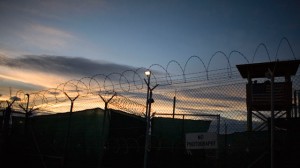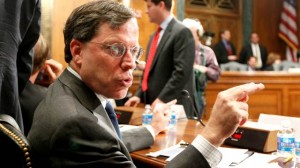The memo, written by Philip D. Zelikow, who at the time was counselor to Secretary of State Condoleezza Rice, “reflects strong internal disagreement within the George W. Bush administration over the constitutionality of such techniques…”
“According to Zelikow’s accounts, he authored the memo in an attempt to counter the Bush administration’s dubious claim that CIA could still practice ‘enhanced interrogation’ on enemy combatants despite the president’s December 2005 signing into law of the McCain Amendment, which, in Zelikow’s words, ‘extended the prohibition against cruel, inhuman, or degrading treatment to all conduct worldwide.’”
Although it was believed that all copies of the Zelikow memo had been burned, shredded or otherwise eliminated, a copy was found by the State Department and declassified in response to Freedom of Information Act requests by the National Security Archive and Spencer Ackerman of Wired magazine. (View the memo in a PDF.)
Zelikow, who had previously served as executive director of the 9/11 Commission, was Secretary Rice’s representative on terrorism issues to the National Security Council’s deputies. His memo read, in part:
“If the techniques, taken together, are intrinsically cruel, inhuman or degrading — i.e., if under American constitutional law they would be either considered cruel and unusual or shock the conscience, then they are prohibited.”
“[It] appears to us that several of these techniques, singly or in combination, should be considered ‘cruel, inhuman or degrading treatment or punishment… The techniques least likely to be sustained are the techniques described as ‘coercive,’ especially viewed cumulatively, such as the waterboard, walling, dousing, stress positions and cramped confinement.”
“…We are unaware of any precedent in World War II, the Korean war, the Vietnam war or any subsequent conflict for authorized, systematic interrogation practices similar to those in question here, even where the prisoners were presumed to be unlawful combatants.”
In an interview with the British newspaper The Guardian, “Zelikow said his position as counselor to Rice did not entitle him to offer a legal opinion, but he felt obliged to put an alternative view before his colleagues at other agencies to warn them that the courts may take a different view…
“Zelikow told the Guardian in an email exchange that while he did not use the word torture in the memo, he believes that is what the CIA was using. ‘I do regard the interrogation practices and conditions of confinement, taken together, as torture – in the ordinary layman’s use of this term. But …”torture” is also a term with a carefully worded legal meaning and definition. So I tend to avoid talking about “torture” because it would appear I’m accusing officials of criminal activity, which I’m not sure was the case,’ he said.
“’I have sometimes just referred to “physical torment” instead, which seems expressive and is accurate.’”

In this photograph reviewed by the U.S. Military, the sun rises over Guantanamo detention facility, at the U.S. Naval Base, in Guantanamo Bay, Cuba, Nov. 19, 2008. (AP Photo/Brennan Linsley, File)
Khalid Sheikh Mohammed was among those subjected to waterboarding and other interrogation extremes described in the declassified memo. “The problem of the codes of conduct we adopted in a twilight war like this have been alleviated in recent years,” Zelikow said in an interview with the Associated Press, “but the basic issues are not going away.”


